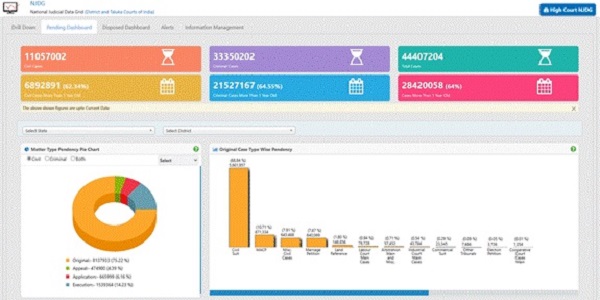Introduction: In the digital age, access to legal information and proceedings is paramount for a transparent and efficient judicial system. The National Judicial Data Grid (NJDG), an integral part of the eCourts Project, stands as a remarkable online platform offering real-time insights into the orders, judgments, and case details from District & Subordinate Courts and High Courts across India.
1. A Comprehensive Overview of NJDG: The National Judicial Data Grid serves as an extensive database encompassing orders, judgments, and case details from a vast network of District & Subordinate Courts and High Courts. This platform, created under the eCourts Project, aims to digitize and streamline judicial information.
2. Real-time Updates and Extensive Coverage: NJDG features data from 18,735 District & Subordinate Courts and High Courts. Its strength lies in near real-time updates facilitated by the connected District and Taluka courts. This comprehensive coverage provides a holistic view of judicial proceedings and decisions from computerized courts nationwide.
3. Unveiling the Power of eCourts Services: Through the eCourts services platform and elastic search technology, NJDG offers litigants access to case status information for over 23.58 crore cases and 22.56 crore orders/judgments. The platform enables users to drill down into case data based on factors like case age, State, and District.
4. NJDG: A Tool for Progress and Efficiency: Beyond being a repository of legal data, NJDG functions as a powerful monitoring tool. It aids in identifying, managing, and reducing case pendency. By providing timely inputs for policy decisions, NJDG contributes to minimizing delays in case disposal and offers better court performance insights.
5. World Bank Recognition and Accessibility: NJDG’s impact extends beyond borders. The World Bank acknowledged its significance in the Ease of Doing Business report for 2018. The platform facilitated case management reports, enhancing contract enforcement. Adhering to the National Data Sharing and Accessibility Policy (NDSAP), NJDG offers an open API to government entities, enabling easy data access for evaluation and monitoring.
6. Future Prospects and Expansion: The NJDG’s journey is ongoing. While already connecting institutional litigants to its data, there are plans to expand accessibility to non-institutional litigants. This move will further democratize legal information and empower a wider spectrum of users.
Conclusion: The National Judicial Data Grid (NJDG) stands as a testament to India’s commitment to transparency, efficiency, and progress in its judicial system. By offering comprehensive and real-time access to legal information, NJDG contributes to reducing case pendency, enhancing performance monitoring, and facilitating informed policy decisions. As NJDG continues to evolve, it holds the potential to redefine the way legal information is accessed and utilized across the nation.
*******
Ministry of Law and Justice
National Judicial Data Grid : a database of orders, judgments and case details created as an online platform under the eCourts Project.
National Judicial Data Grid (NJDG) is a database of orders, judgments and case details of 18,735 District & Subordinate Courts and High Courts created as an online platform under the eCourts Project. Data is updated on a near real-time basis by the connected District and Taluka courts. It provides data relating to judicial proceedings/decisions of all computerized district and subordinate courts of the country. All High Courts have also joined the National Judicial Data Grid (NJDG) through web services, providing easy access facility to the litigant public.
Through the eCourts services platform using elastic search technology, currently litigants can access case status information in respect of over 23.58 crore cases and more than 22.56 crore orders / judgments pertaining to these computerized courts as on date. Case data is available on NJDG for both civil and criminal cases with the ability to perform drill-down analysis based on the age of the case as well as the State and District. NJDG works as a monitoring tool to identify, manage and reduce pendency of cases. It helps to provide timely inputs for making policy decisions to reduce delays in disposing of cases and helps in reducing case pendency. It also facilitates better monitoring of court performance and systemic bottlenecks, and, thus, serves as an efficient resource management tool. To track cases related to land disputes, Land Records data of 26 States have been linked with NJDG.

World Bank praised the National Judicial Data Grid in the Ease of Doing Business report for 2018, that it made possible to generate case management reports, thereby making it easier to enforce contracts. In consonance with the National Data Sharing and Accessibility Policy (NDSAP) announced by the Government of India, Open Application Programming Interface (API) has been provided to the Central & State Government to allow easy access to the NJDG data using a departmental ID and access key. This will allow the institutional litigants to access the NJDG data for their evaluation and monitoring purposes. It is proposed to expand the facility to non-institutional litigants as well in future.




